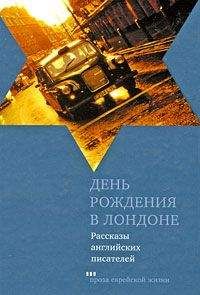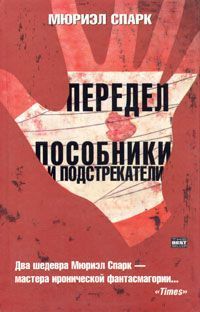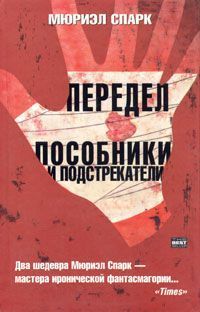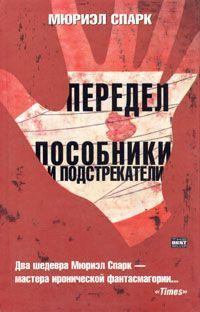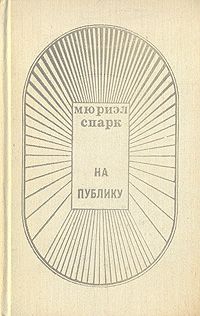Мюриэль Спарк - Английский язык с Мюриэль Спарк (рассказы)
"During the war there was a lot of boys like you from the States," Elizabeth said, giving him a sideways look.
Henry held out his hand to the second youngest child, a girl of seven, and said, "Come talk to me."
The child said nothing, only dipped into the box of sweets, which Lou had brought.
"Come talk," said Henry.
Elizabeth laughed (Элизабет засмеялась; to laugh — смеяться). "If she does talk (если она действительно заговорит) you'll be sorry (вы пожалеете; tobesorry— переживать, сожалеть) you ever asked (что вообще попросили ее; toask— просить, спрашивать). She's got a tongue in her head (она остра на язычок: «она имеет язык в ее голове»), that one (та /девчонка/). You should hear (вы бы слышали: «вам следует послушать») her cheeking up to the teachers (как она дерзит учителям; tocheek— вести себя нагло, говорить дерзости)." Elizabeth 's bones jerked with laughter (кости Элизабет сотрясались от смеха; tojerk— резко дергать, двигаться резкими толчками) among her loose clothes (в ее просторной одежде; loose— неприлегающий, широкий). There was a lopsided double bed in the corner (кривобокая двухместная кровать стояла в углу), and beside it (и рядом с ней) a table cluttered with mugs (стол, заваленный кружками), tins (консервными банками), a comb (расческой) and brush (щеткой для волос), a number of hair curlers (неким количеством: «числом» бигуди), a framed photograph of the Sacred Heart (изображением в рамке Пресвятого Сердца Иисусова; aframe— рамка; Пресвятое Сердце — имя данное католиками физическому Сердцу Иисуса как символу Божественной Любви, изображается с ранами, увенчанное терновым венцом), and also Raymond noticed (и также Раймонд заметил) what he thought erroneously to be a box of contraceptives (коробочку, которую он ошибочно принял за упаковку контрацептивов: «что он думал ошибочно было коробочкой контрацептивов»). He decided to say nothing to Lou about this (он решил ничего не говорить Лу об этом); he was quite sure (он был совершенно уверен) she must have observed other things (что она увидела /много/ другого: «других вещей») which he had not (которого он не /заметил/); possibly things of a more distressing nature (возможно, вещей еще более огорчительных: «огорчительных по сути/природе»; todistress— причинять горе, страдания).
tongue [tAN] cheek [Ci: k] lopsided ["lOp'saIdId] erroneous [I'rqVnIqs]
Elizabethlaughed. "If she does talk you'll be sorry you ever asked. She's got a tongue in her head, that one. You should hear hercheekingup to the teachers." Elizabeth 's bones jerked with laughter among her loose clothes. There was a lopsided double bed in the corner, and beside it a table cluttered with mugs, tins, a comb and brush, a number of hair curlers, a framed photograph of the Sacred Heart, and also Raymond noticed what he thought erroneously to be a box of contraceptives. He decided to say nothing to Lou about this; he was quite sure she must have observed other things which he had not; possibly things of a more distressing nature.
Lou's chatter on the way back to the hotel (болтовня Лу по пути назад в гостиницу) had a touch of hysteria (имела оттенок истерии; touch — прикосновение; оттенок). "Raymond, dear (Раймонд, дорогой)," she said in her most chirpy West End voice (своим сверх-жизнерадостным голосом богатой дамы: «очень веселым голосом из Уэст Энда»; West End — западнаяфешенебельнаячасть Лондона), "I simply had (я просто обязана) to give the poor dear (отдать бедняжке; poor — бедный, неимущий) all my next week's housekeeping money (все мои хозяйственные деньги на следующую неделю; to housekeep — вестидомашнеехозяйство). We shall have to starve (нам придется голодать), darling (дорогой), when we get home (когда мы вернемся домой). That's simply what we shall have to do (именно это мы должны будем сделать: «это просто то, что мы должны сделать»)."
"O.K. (хорошо)," said Raymond.
"I ask you (я спрашиваю тебя)," Lou shrieked (кричала Лу), "what else could I do (что еще я могла сделать), what could I do (что я могла сделать)?"
''Nothing at all (ничего больше)," said Raymond, "but what you've done (чем то, что ты уже сделала)."
"My own sister, my dear (моя собственная сестра, дорогой мой)," said Lou; "and did you see the way she had her hair bleached (ты видел, как она обесцветила свои волосы; to bleach — белить, обесцвечивать)? — All streaky (все испорчены; streaky — сполосками, прожилками) and she used to have a lovely head of hair (а ведь у нее была когда-то прекрасная копна /голова/ волос)."
"I wonder if she tries to raise herself (интересно, собирается ли она что-нибудь предпринять; towonder— интересоваться, желать знать, изумляться;toraise— подняться, выбиться в люди)?'' said Raymond. "With all those children (со всеми ее: «теми» детьми) she could surely get better accommodation (она точно могла бы найти лучшее место для проживания; accommodation— приют, пристанище, проживание) if only she (если бы она только) —"
hysteria [hI'stI(q)rIq] chirpy ['Cq: pI] shriek [Sri: k] bleached [bli: Ct]
Lou's chatter on the way back to the hotel had a touch of hysteria. "Raymond, dear," she said in her most chirpy West End voice, "I simply had to give the poor dear all my next week's housekeeping money. We shall have to starve, darling, when we get home. That's simply what we shall have to do."
"O K.," said Raymond.
"I ask you," Lou shrieked, "what else could I do, what could I do?"
''Nothing at all" said Raymond, "but what you've done."
"My own sister, my dear," said Lou; "and did you see the way she had her hair bleached? — All streaky and she used to have a lovely head of hair."
"I wonder if she tries to raise herself?'' said Raymond "With all those children she could surely get better accommodation if only she —
"That sort (/люди/ такого сорта)," said Henry, leaning forward from the back of the car (наклонившись вперед с заднего сидения машины), "never moves (никогда не действуют: «двигаются»). It's the slum mentality, man (это менталитет/умонастроение/ трущоб, приятель). Take some folks I've seen back home (возьми /для примера/ некоторых людей, которых, я видел у себя дома —
"There's no comparison (здесь не /может быть речи о/ сравнении; tocompare— сравнивать).'' Lou snapped suddenly (огрызнулась внезапно Лу), "this is quite a different case (здесь: «это» совершенно другой случай).''
Raymond glanced at her in surprise (Раймонд взглянул на нее с удивлением; surprise— изумление, неожиданность, сюрприз): Henry sat back (Генри откинулся: «сел» назад), offended (обиженный). Lou was thinking wildly (Лу думала в бешенстве: «дико»), what a cheek (какая наглость) him talking like a snob (что он разговаривает, как сноб). At least Elizabeth 's white (по крайней мере, Элизабет белая).
slum [slAm] mentality [men'txlItI] comparison [kqm'pxrIs(q)n]
"That sort," said Henry, leaning forward from the back of the car, "never moves. It's the slum mentality, man. Take some folks I've seen back home —
"There's no comparison.'' Lou snapped suddenly, "this is quite a different case."
Raymond glanced at her in surprise: Henry sat back, offended. Lou was thinking wildly, what a cheek him talking like a snob. At least Elizabeth 's white.
Their prayers for the return of faith to Henry Pierce (их молитвы за возвращение веры к Генри Пирсу) were so far answered in that (были пока вознаграждены: «получили ответ» тем, что) he took a tubercular turn (сначала он заболел туберкулезом: «дела приняли туберкулезный оборот») which was followed by a religious one (после чего он вернулся к религии: «за которым последовал религиозный»; to take a turn — принятьоборот, измениться, повернуться). He was sent off to a sanatorium in Wales (он был отправлен в санаторий в Уэльсе) with a promise from Lou and Raymond (с обещанием от Лу и Раймонда) to visit him before Christmas (навестить его до Рождества). Meantime (тем временем), they applied themselves to Our Lady (они обратились с просьбой к Пресвятой Деве Марии; to apply — обращатьсяспросьбой, просить) for the restoration of Henry's health (о восстановлении здоровья Генри).
Oxford St. John (Оксфорд Сент. — Джон), whose love affair with the red-haired girl (чья любовная интрижка с рыжеволосой девушкой) had come to grief (плохо закончилась; grief — горе, печаль, огорчение), now frequented their flat (теперь часто посещал их квартиру), but he could never quite replace Henry (но он так и не смог: «никогда не мог» полностью заменить Генри) in their affections (в их привязанностях). Oxford was older and less refined than Henry (Оксфорд был старше Генри, и менее утонченный; refined — изысканный, благородный). He would stand (он бывало стоял) in front of the glass in their kitchen (перед зеркалом: «стеклом» на их кухне) and tell himself (и говорил сам себе): "Man, you just a big black bugger (приятель, да ты просто большой черный шельмец: «мерзавец»)." He kept referring to himself as black (он продолжал называть себя черным; to refer to — называть, отсылать, даватьссылку), which of course he was (каковым он, конечно, и был), Lou thought (думала Лу), but it was not the thing to say (но об этом не стоило говорить: «но это не была вещь, о которой говорить»). He stood in the doorway (он стоял в дверях: «дверном проеме») with his arms and smile thrown wide (с широко раскинутыми руками и широкой улыбкой /на лице/: «с его руками и улыбкой раскинутыми широко»): "I am black but comely (я черный, но симпатичный; comely — миловидный, хорошенький). O ye daughters of Jerusalem (о вы, дочери Иерусалимские)". And once, when Raymond was out (и однажды, когда Раймонда не было дома; to be out — отсутствовать, небытьдома, наместе), Oxford brought the conversation round to that question (Оксфорд подвел тему разговора к вопросу о том; to bring — приносить, приводить) of being black all over (/он/ был черен везде: «повсюду»), which made Lou very uncomfortable (что заставило Лу почувствовать себя очень неуютно; (un)comfortable — (не)удобный, (не)комфортабельный) and she kept looking at the clock (и она постоянно смотрела на часы) and dropped stitches in her knitting (и пропускала петли в своем вязании; to drop — капать, ронять).
tubercular [tju:'bq: kjVlq] grief [gri: f] bugger ['bAgq] knitting ['nItIN]
Their prayers for the return of faith to Henry Pierce were so far answered in that he took a tubercular turn, which was followed by a religious one. He was sent off to a sanatorium in Wales with a promise from Lou and Raymond to visit him before Christmas. Meantime, they applied themselves to Our Lady for the restoration of Henry's health.
Oxford St. John, whose love affair with the red-haired girl had come to grief, now frequented their flat, but he could never quite replace Henry in their affections. Oxford was older and less refined than Henry. He would stand in front of the glass in their kitchen and tell himself. "Man, you just a big black bugger." He kept referring to himself as black, which of course he was, Lou thought, but it was not the thing to say. He stood in the doorway with his arms and smile thrown wide: "I am black but comely. O ye daughters of Jerusalem." And once, when Raymond was out, Oxford brought the conversation round to that question of being black all over, which made Lou very uncomfortable and she kept looking at the clock and dropped stitches in her knitting.
